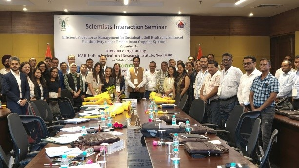10 July 2025, New Delhi
The Division of Agronomy at the ICAR-Indian Agricultural Research Institute, New Delhi, organized a one-day National Seminar on “Efficient Phosphorus Management in Predominant Cropping Systems” today. The seminar aimed to address key challenges and opportunities in phosphorus (P) management to promote sustainable soil health and enhance crop productivity across India’s diverse agro-ecological regions.
The seminar was graced by Dr. Ch. Srinivasa Rao, Director, ICAR-IARI, as the Chief Guest. In his inaugural address, Dr. Rao emphasized the urgent need for a long-term, location-specific research strategy to enhance phosphorus use efficiency. He particularly underscored the importance of conducting field trials in red soils, which are characterized by low pH and limited phosphorus availability, calling for tailored nutrient management solutions.
Dr. P.S. Brahmanand, Project Director, Water Technology Centre, attended the seminar as the Guest of Honour, along with Heads of Divisions, scientists from various disciplines, Co-Principal Investigators, project staff, postgraduate students, and representatives from OCP India Limited, a key industry collaborator.

Researchers and collaborators from multiple institutions presented findings from ongoing multilocation field trials, offering valuable insights into phosphorus dynamics in different cropping systems. The technical sessions facilitated detailed discussions on refining field trial designs and strengthening implementation strategies to generate robust, scalable, and replicable results.
The seminar concluded with a strong recommendation to frame a comprehensive long-term research roadmap focused on efficient phosphorus management. The proposed strategy will aim to enhance nutrient use efficiency, improve soil health, and boost crop productivity, particularly in phosphorus-deficient regions.
The event marked a significant step forward in addressing nutrient management challenges and strengthening science-led solutions for sustainable agriculture.
(Source: ICAR-Indian Agricultural Research Institute, New Delhi)








Like on Facebook
Subscribe on Youtube
Follow on X X
Like on instagram